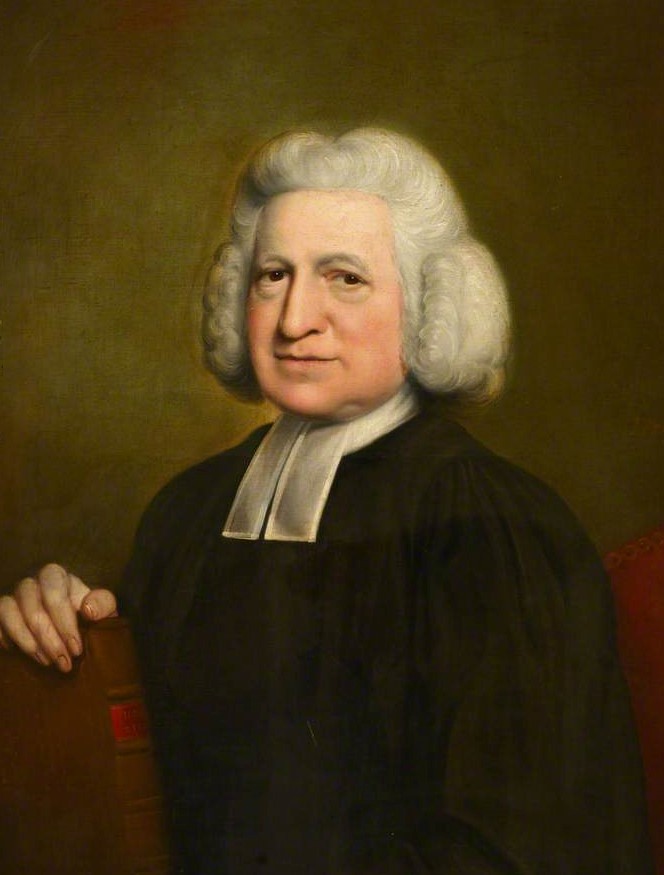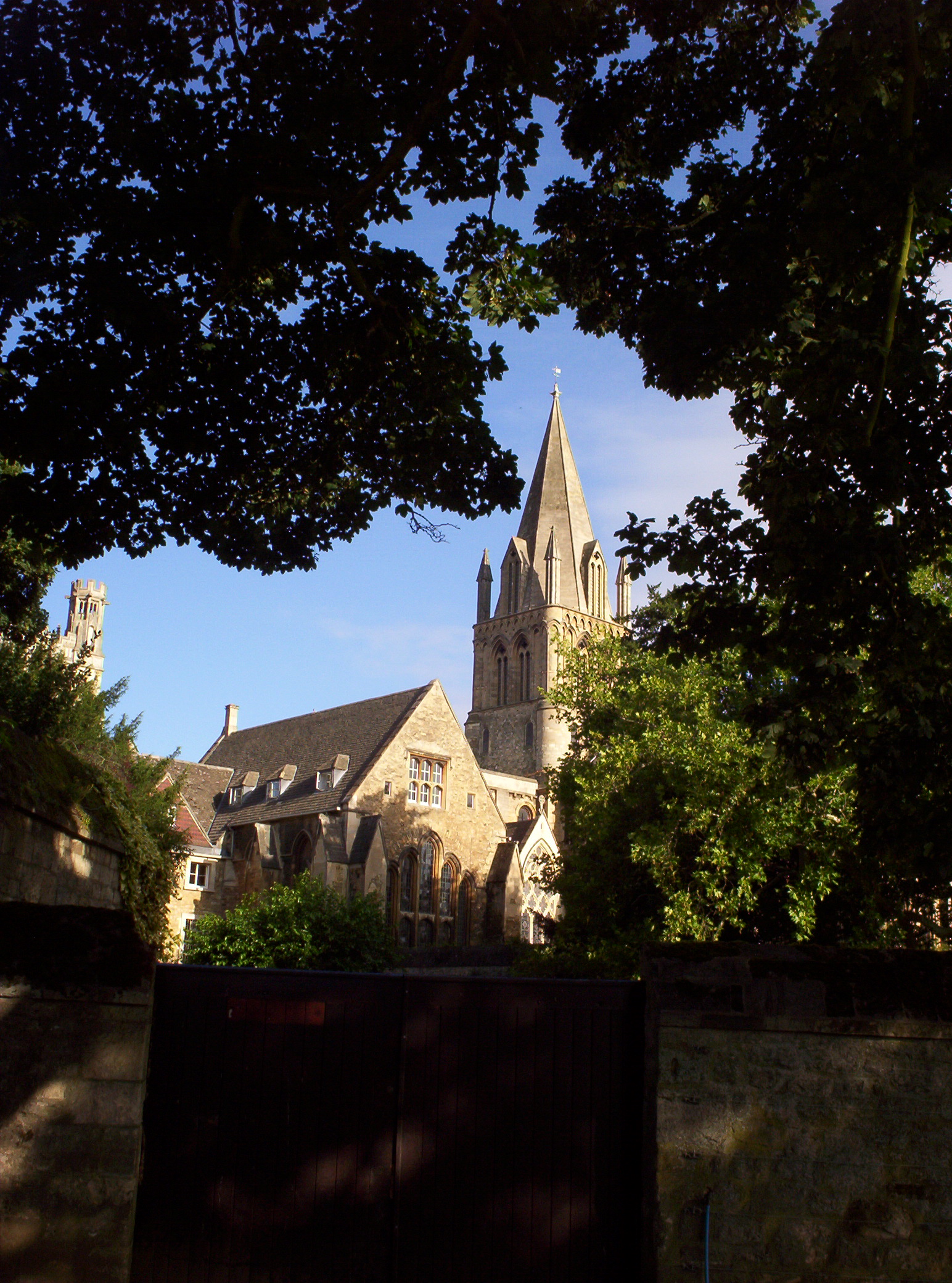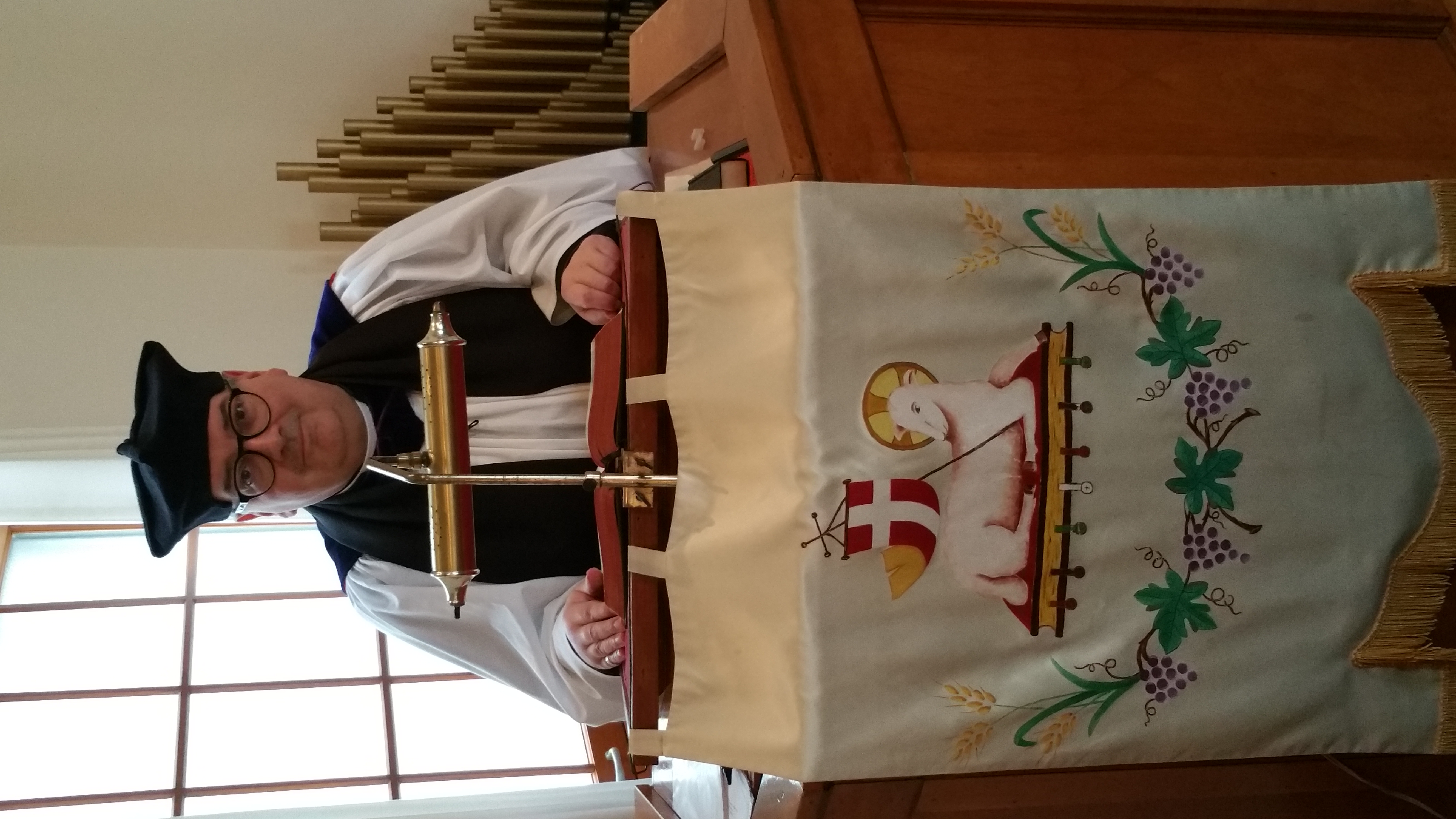|
Charles Wesley
Charles Wesley (18 December 1707 – 29 March 1788) was an English leader of the Methodist movement. Wesley was a prolific hymnwriter who wrote over 6,500 hymns during his lifetime. His works include " And Can It Be", " Christ the Lord Is Risen Today", the carol "Hark! The Herald Angels Sing", and " Lo! He Comes With Clouds Descending". Charles Wesley was born in Epworth, Lincolnshire, the son of Anglican cleric and poet Samuel Wesley and his wife Susanna. He was a younger brother of Methodist founder John Wesley and Anglican cleric Samuel Wesley the Younger, and he became the father of musician Samuel Wesley and grandfather of musician Samuel Sebastian Wesley. He was educated at Oxford University, where his brothers had also studied, and he formed the "Holy Club" among his fellow students in 1729. John Wesley later joined this group, as did George Whitefield. Charles followed his father and brother into the church in 1735, and he travelled with John to Georgia in America, re ... [...More Info...] [...Related Items...] OR: [Wikipedia] [Google] [Baidu] |
The Reverend
The Reverend is an style (manner of address), honorific style most often placed before the names of Christian clergy and Minister of religion, ministers. There are sometimes differences in the way the style is used in different countries and church traditions. ''The Reverend'' is correctly called a ''style'' but is often and in some dictionaries called a title, form of address, or title of respect. The style is also sometimes used by leaders in other religions such as Judaism and Buddhism. The term is an anglicisation of the Latin ''reverendus'', the style originally used in Latin documents in medieval Europe. It is the gerundive or future passive participle of the verb ''revereri'' ("to respect; to revere"), meaning "[one who is] to be revered/must be respected". ''The Reverend'' is therefore equivalent to ''The Honourable'' or ''The Venerable''. It is paired with a modifier or noun for some offices in some religious traditions: Lutheran archbishops, Anglican archbishops, and ... [...More Info...] [...Related Items...] OR: [Wikipedia] [Google] [Baidu] |
Samuel Wesley
Samuel Wesley (24 February 1766 – 11 October 1837) was an English organist and composer in the late Georgian period. Wesley was a contemporary of Mozart (1756–1791) and was called by some "the English Mozart".Kassler, Michael & Olleson, Philip (2001). ''Samuel Wesley (1766–1837): A Source Book''. Ashgate. Personal life Born in Bristol, he was the son of noted Methodist and hymnodist Charles Wesley, the grandson of Samuel Wesley (a poet of the late Stuart period) and the nephew of John Wesley, the founder of the Methodist Church. His early musical education mostly took place in the family home in Bristol, where Sarah Wesley, his mother, sang and played the harpsichord. Hymn tunes and the works of Handel were the family's favourite pieces. Samuel also had lessons from David Williams, the organist of All Saints' Church, Bristol. In 1771 his father acquired a second house, in Chesterfield Street, Marylebone, London. Samuel left Bristol for the house in London by 1778. Samu ... [...More Info...] [...Related Items...] OR: [Wikipedia] [Google] [Baidu] |
Province Of Georgia
A province is almost always an administrative division within a country or state. The term derives from the ancient Roman ''provincia'', which was the major territorial and administrative unit of the Roman Empire's territorial possessions outside Italy. The term ''province'' has since been adopted by many countries. In some countries with no actual provinces, "the provinces" is a metaphorical term meaning "outside the capital city". While some provinces were produced artificially by colonial powers, others were formed around local groups with their own ethnic identities. Many have their own powers independent of central or federal authority, especially in Canada and Pakistan. In other countries, like China or France, provinces are the creation of central government, with very little autonomy. Etymology The English word ''province'' is attested since about 1330 and derives from the 13th-century Old French , which itself comes from the Latin word , which referred to the sphere ... [...More Info...] [...Related Items...] OR: [Wikipedia] [Google] [Baidu] |
George Whitefield
George Whitefield (; 30 September 1770), also known as George Whitfield, was an Anglican cleric and evangelist who was one of the founders of Methodism and the evangelical movement. Born in Gloucester, he matriculated at Pembroke College at the University of Oxford in 1732. There he joined the "Holy Club" and was introduced to the Wesley brothers, John and Charles, with whom he would work closely in his later ministry. Whitefield was ordained after receiving his Bachelor of Arts degree. He immediately began preaching, but he did not settle as the minister of any parish. Rather he became an itinerant preacher and evangelist. In 1740, Whitefield traveled to North America, where he preached a series of revivals that became part of the " Great Awakening". His methods were controversial and he engaged in numerous debates and disputes with other clergymen. Whitefield received widespread recognition during his ministry; he preached at least 18,000 times to perhaps 10 million listeners ... [...More Info...] [...Related Items...] OR: [Wikipedia] [Google] [Baidu] |
Holy Club
The "Holy Club" was an organization at Christ Church, Oxford, formed in 1729 by brothers John and Charles Wesley, who later contributed to the formation of the Methodist Church. The brothers and associates, including George Whitefield, met for prayer, Bible study, and pious discipline. History The "Holy Club" started in November 1729 when John Wesley went to live at the University of Oxford. When he came to reside there, three of his friends along with himself agreed to spend three or four evenings together, every week. Their intention was to "read over" (skim through and discuss) the classics together, which they had already read before privately and to read a book about divinity on Sundays. Charles Wesley, John's brother, was one of the four individuals making up this small cell group. The actual title of "The Holy Club" was not a name which any of the members came up with, but rather was a title bestowed upon them (most likely as an insult by those trying to mock them). As ... [...More Info...] [...Related Items...] OR: [Wikipedia] [Google] [Baidu] |
Oxford University
Oxford () is a city in England. It is the county town and only city of Oxfordshire. In 2020, its population was estimated at 151,584. It is north-west of London, south-east of Birmingham and north-east of Bristol. The city is home to the University of Oxford, the oldest university in the English-speaking world; it has buildings in every style of English architecture since late Anglo-Saxon. Oxford's industries include motor manufacturing, education, publishing, information technology and science. History The history of Oxford in England dates back to its original settlement in the Saxon period. Originally of strategic significance due to its controlling location on the upper reaches of the River Thames at its junction with the River Cherwell, the town grew in national importance during the early Norman period, and in the late 12th century became home to the fledgling University of Oxford. The city was besieged during The Anarchy in 1142. The university rose to domina ... [...More Info...] [...Related Items...] OR: [Wikipedia] [Google] [Baidu] |
Samuel Sebastian Wesley
Samuel Sebastian Wesley (14 August 1810 – 19 April 1876) was an English organist and composer. Wesley married Mary Anne Merewether and had 6 children. He is often referred to as S.S. Wesley to avoid confusion with his father Samuel Wesley. Biography Born in London, he was the eldest child in the composer Samuel Wesley's second family, which he formed with Sarah Suter having separated from his wife Charlotte. Samuel Sebastian was the grandson of Charles Wesley. His middle name derived from his father's lifelong admiration for the music of Bach. After singing in the choir of the Chapel Royal as a boy, Samuel Sebastian embarked on a career as a musician, and was appointed organist at Hereford Cathedral in 1832. While there he married the sister of the Dean, John Merryweather. S.S. Wesley was, like his father Samuel Wesley, a Freemason. He was initiated in Palladian Lodge No.120 in Hereford on 17 September 1833. He moved to Exeter Cathedral three years later, and joined St ... [...More Info...] [...Related Items...] OR: [Wikipedia] [Google] [Baidu] |
Anglican Cleric
The Anglican ministry is both the leadership and agency of Christian service in the Anglican Communion. "Ministry" commonly refers to the office of ordination, ordained clergy: the ''threefold order'' of bishops, priests and deacons. More accurately, Anglican ministry includes many laity, laypeople who devote themselves to the ministry of the church, either individually or in lower/assisting offices such as lector, acolyte, sub-deacon, Eucharistic minister, cantor, musicians, parish secretary or assistant, warden, vestry member, etc. Ultimately, all baptism, baptized members of the church are considered to partake in the ministry of the Body of Christ. Each of the ecclesiastical province, provinces (usually corresponding to individual world nations) of the Anglican Communion has a high degree of independence from the other provinces, and each of them have slightly different structures for ministry, mission and governance. However, personal leadership is always vested in a member o ... [...More Info...] [...Related Items...] OR: [Wikipedia] [Google] [Baidu] |
Epworth, Lincolnshire
Epworth is a town and civil parish in the Isle of Axholme, North Lincolnshire, England.OS Explorer Map 280: Isle of Axholme, Scunthorpe and Gainsborough: (1:25,000) : The town lies on the A161, about halfway between Goole and Gainsborough. As the birthplace of John Wesley and Charles Wesley, it has given its name to many institutions associated with Methodism. Their father, Samuel Wesley, was the rector from 1695 to 1735. History Epworth is in the Isle of Axholme. The Isle is so called because, until it was drained by the Dutch engineer Sir Cornelius Vermuyden in 1627–1629, it was an inland island, surrounded by rivers, streams, bogs and meres. The Domesday Book in 1086 recorded: "Manor In Epeuerde, Ledwin had eight carucates of land to be taxed. Land to twelve ploughs. Geoffrey de Wirce has there two ploughs, and eight sokemen, with two carucates and five oxgangs of this land; and thirteen villanes and nine bordars with six ploughs, and eleven fisheries of five shillin ... [...More Info...] [...Related Items...] OR: [Wikipedia] [Google] [Baidu] |
Hark! The Herald Angels Sing
"Hark! The Herald Angels Sing" is an English Christmas carol that first appeared in 1739 in the collection ''Hymns and Sacred Poems''. The carol, based on , tells of an angelic chorus singing praises to God. As it is known in the modern era, it features lyrical contributions from Charles Wesley and George Whitefield, two of the founding ministers of Methodism, with music adapted from " Vaterland, in deinen Gauen" by Felix Mendelssohn. Wesley, who had written the original version as "Hymn for Christmas-Day," had requested and received slow and solemn music for his lyrics, which has since largely been discarded. In 1840—a hundred years after the publication of ''Hymns and Sacred Poems''—Mendelssohn composed a cantata to commemorate Johann Gutenberg's invention of movable type printing, and it is music from this cantata, adapted by the English musician William H. Cummings to fit the lyrics of "Hark! The Herald Angels Sing", that propels the carol known today. [...More Info...] [...Related Items...] OR: [Wikipedia] [Google] [Baidu] |
Christ The Lord Is Risen Today
"Christ the Lord Is Risen Today" is a Christian hymn associated with Easter. Most of the stanzas were written by Charles Wesley, and the hymn appeared under the title "Hymn for Easter Day" in ''Hymns and Sacred Poems'' by Charles and John Wesley in 1739. The hymn eventually became well known for the "Alleluia" sung as a melisma after each line, which was added by an unknown author, probably to fit the commonly used hymn tune, "Easter Hymn". It remains a traditional processional hymn on Easter Sunday. History Charles Wesley, the co-founder of the Methodism, Methodist movement, wrote "Christ the Lord Is Risen Today" in 1739 where it was initially titled "Hymn for Easter Day". The new hymn was first performed at the first service at The Foundery Meeting House after Wesley had adapted it into the first Methodist chapel. Following this, Wesley published it in the ''Hymns and Sacred Poems'' hymnal of 1739, initially with eleven verses of four lines each. The hymn was subsequently ... [...More Info...] [...Related Items...] OR: [Wikipedia] [Google] [Baidu] |

.jpg)







